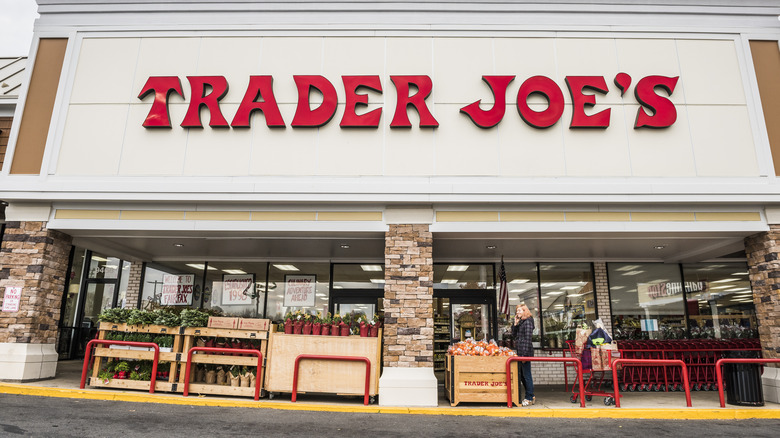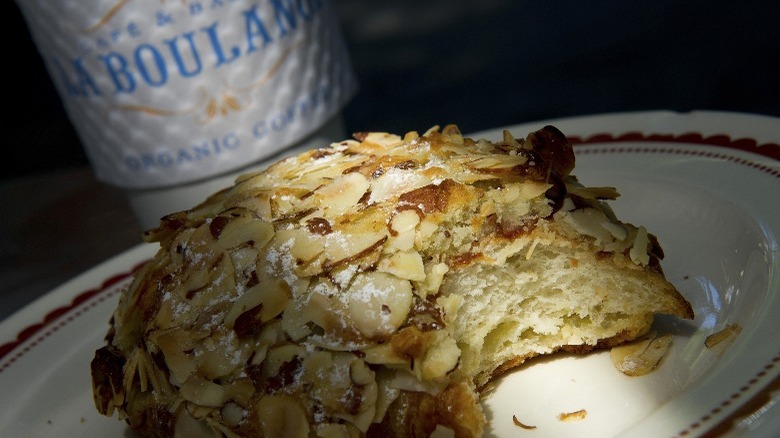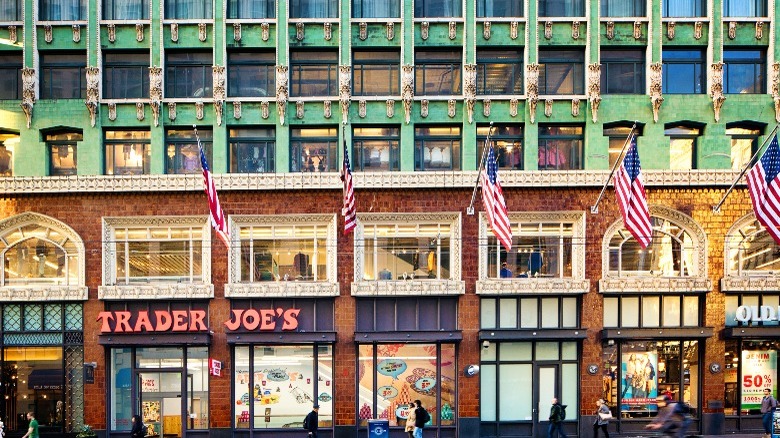The Trader Joe's Bread Brand That's Unexpectedly Related To Starbucks
Trader Joe's, much like Aldi or Costco, is known to rely upon third parties to manufacture their unique private-labeled products, which isn't a bad thing for consumers. Due to its business model, the company often supplies customers with a wide selection of high-end, name-brand products at a cheaper cost, all thanks to a packaging swap. The retailer is very secretive about which producers provide what, but sometimes an educated guess is all that's needed to ascertain where specific products originated, like when figuring out who's probably behind Trader Joe's brand pistachios. However, speculation isn't always required. In some instances, certain manufacturers have been confirmed. Either way, on rare occasions, these discoveries lead to unexcepted partnerships, which may also unveil some notable associations with other big-name companies, like Starbucks.
This happens to be the case when discussing Trader Joe's bread selection. Nonetheless, to say that the company's bread has a direct connection to the gigantic coffee corporation may be a bit of an oversimplification. Like most things, the facts are often more complex than initially meets the eye. Still, a roundabout link is there, all as a result of La Boulange's founder and prominent baker, Pascal Rigo.
La Boulange, Starbucks, and La Boulangerie de San Francisco
To explain the tie between Trader Joe's bread and Starbucks, you must learn about Pascal Rigo and his former affiliation with the coffee company. Rigo came to Los Angeles in the early '90s as a baker from Cap Ferret, France, bringing along his take on French bread. Soon the rising breadmaker was providing his wares to renowned establishments like L'Hermitage and the Checker Hotel's dining room. However, he shortly thereafter relocated to the Bay Area, opening La Boulange's Pine Street bakery in 1997, which expanded into four commercial and 22 cafe bakeries by 2012. Around this time, Starbucks acquired the brand for $100 million and soon appointed Rigo as its food division leader. Between 2013 and 2015, Rigo went on to help Starbucks build up its food sales, increasing annual revenue to $3 billion.
Yet, due to some marketing and promotional differences, Pascal soon found himself at odds with the corporation. Despite Rigo's attempts to introduce his product to a larger market through Starbucks' framework, he was met with opposition: "We stuck to our principles, offering great bread at affordable prices ... The big frustration was that nobody knew about it." he said to Bake. "I told Starbucks, 'Let's ... tell people about the food.' They said no." Consequently, Pascal stepped away from the partnership, which resulted in Starbucks closing all of its La Boulange's Bay Area locations. However, Rigo soon bought back some of the properties and reopened them as La Boulangerie de San Francisco.
La Boulangerie and Trader Joe's
Despite Rigo's brief tenure with Starbucks, he utilized the connections he helped foster there to obtain national accounts for La Boulangerie with companies like Costco and Trader Joe's. Moreover, Pascal and his team secured a 40,000-square-foot factory containing three distinct divisions (pastry, bread, and viennoiserie) that house 50 workers 24 hours a day to meet demand. The culmination of these efforts has constructed a production line that produces 20,000 croissants, 10,000 organic loaves of bread, and upwards of 10,000 assorted pastries daily — many of which can be found at Trader Joe's.
While the company's products don't bear the La Boulangerie name, one item pays homage to its creator: the Pain Pascal (Pascal bread in French). According to Rigo, providing Trader Joe's with the titular bread made sense based on his desire to sell premium French bread. As he conveyed to The New York Times, "I'm going to show that you can make good bread and good money." Unfortunately, the loaves are only available at 460 store locations and can't be found on the company's website. Still, Trader Joe's doesn't offer online shopping, even if they were. So, the next time you're in a Trader Joe's, take the time to look around; you might find a tasty loaf of bread made in a traditional French style by a brand that not only takes pride in what it produces but also has an unanticipated close connection to Starbucks.


